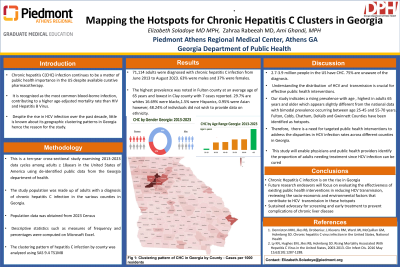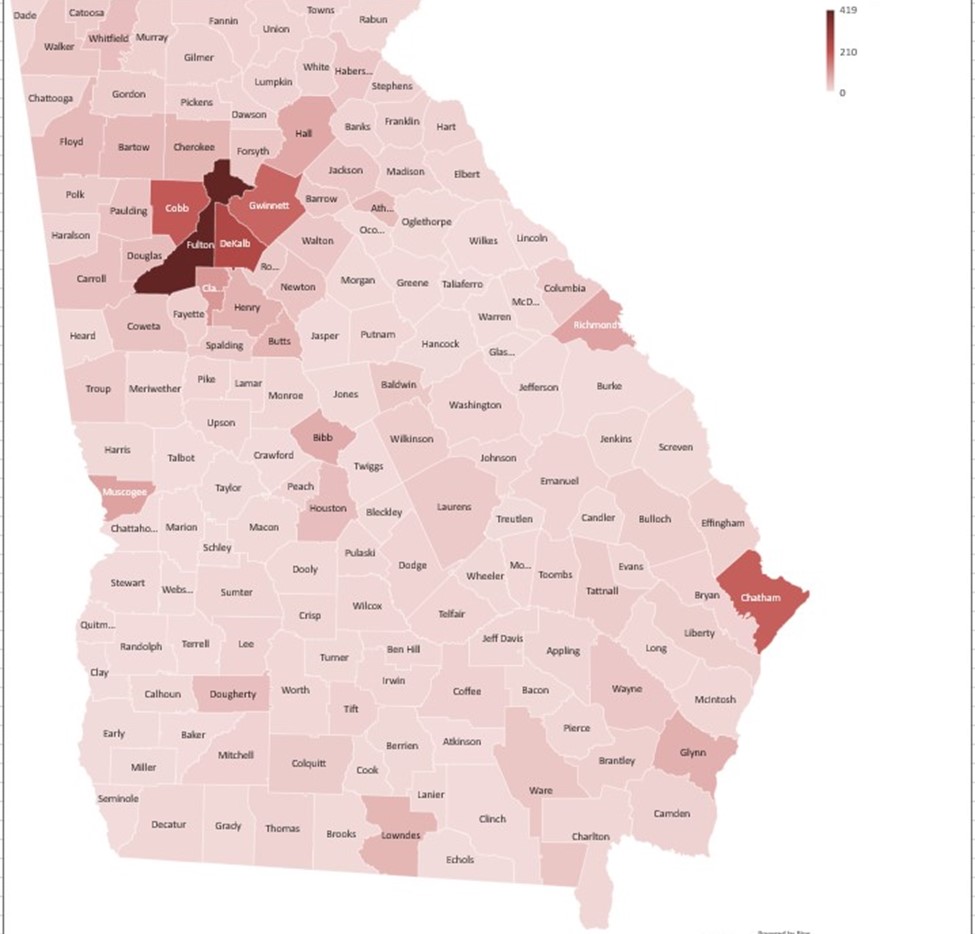Monday Poster Session
Category: Liver
P2916 - Mapping the Hotspots: Chronic Hepatitis C Clusters in Georgia
Monday, October 28, 2024
10:30 AM - 4:00 PM ET
Location: Exhibit Hall E

Has Audio

Elizabeth Soladoye, MD, MPH
Piedmont Athens Regional
Athens, GA
Presenting Author(s)
Elizabeth Soladoye, MD, MPH1, Ami Gandhi, MPH2, Zahraa Rabeeah, MD1
1Piedmont Athens Regional, Athens, GA; 2Georgia Department of Public Health, Atlanta, GA
Introduction: Chronic hepatitis C(CHC) infection continues to be a matter of public health importance in the US despite available curative pharmacotherapy. It is recognized as the most common blood-borne infection, contributing to a higher age-adjusted mortality rate than HIV and Hepatitis B Virus. Despite the rise in HCV over the past decade, little is known about its geographic clustering patterns in Georgia hence the reason for the study.
Methods: This is a ten-year cross-sectional study examining 2013-2023 data cycles among adults ≥ 18years in the United States of America using de-identified public data from the Georgia department of health. The study population was made up of adults with a diagnosis of chronic hepatitis C infection in the various counties in Georgia. Descriptive statistics such as measures of frequency and percentages were computed on Microsoft Excel. The clustering pattern of hepatitis C infection by county was analyzed using SAS 9.4 TS1M8
Results: 71,114 adults were diagnosed with chronic hepatitis C infection from June 2013 to August 2023. 63% were males and 37% were females. The highest prevalence was noted in Fulton county at an average age of 65 years and lowest in Clay county with 7 cases reported. 29.7% are whites 16.69% were blacks,1.5% were Hispanics, 0.95% were Asian however, 48.24% of individuals did not wish to provide data on ethnicity.
Discussion: 2.7-3.9 million people in the US have CHC. 75% are unaware of the diagnosis. Untreated HCV leads to serious liver complications, including cirrhosis, liver failure, and liver cancer. Understanding the distribution and HCV transmission is crucial for effective public health interventions. Our study indicates a rising prevalence with age , highest in adults 65 years and older which appears slightly different from the national data with bimodal prevalence occurring between age 25-45 and 55-70 years. Fulton, Cobb, Chatham, DeKalb and Gwinnett Counties have been identified as hotspots. Therefore there is a need for targeted public health interventions to address the disparities in HCV infection rates across different counties in Georgia. This study will enable physicians and public health providers identify the proportion of adults needing treatment since HCV infection can be cured. Future research endeavors will focus on evaluating the effectiveness of existing public health interventions in reducing HCV transmission, reviewing the socio-economic and environmental factors that contribute to HCV transmission in these hotspots.

Disclosures:
Elizabeth Soladoye, MD, MPH1, Ami Gandhi, MPH2, Zahraa Rabeeah, MD1. P2916 - Mapping the Hotspots: Chronic Hepatitis C Clusters in Georgia, ACG 2024 Annual Scientific Meeting Abstracts. Philadelphia, PA: American College of Gastroenterology.
1Piedmont Athens Regional, Athens, GA; 2Georgia Department of Public Health, Atlanta, GA
Introduction: Chronic hepatitis C(CHC) infection continues to be a matter of public health importance in the US despite available curative pharmacotherapy. It is recognized as the most common blood-borne infection, contributing to a higher age-adjusted mortality rate than HIV and Hepatitis B Virus. Despite the rise in HCV over the past decade, little is known about its geographic clustering patterns in Georgia hence the reason for the study.
Methods: This is a ten-year cross-sectional study examining 2013-2023 data cycles among adults ≥ 18years in the United States of America using de-identified public data from the Georgia department of health. The study population was made up of adults with a diagnosis of chronic hepatitis C infection in the various counties in Georgia. Descriptive statistics such as measures of frequency and percentages were computed on Microsoft Excel. The clustering pattern of hepatitis C infection by county was analyzed using SAS 9.4 TS1M8
Results: 71,114 adults were diagnosed with chronic hepatitis C infection from June 2013 to August 2023. 63% were males and 37% were females. The highest prevalence was noted in Fulton county at an average age of 65 years and lowest in Clay county with 7 cases reported. 29.7% are whites 16.69% were blacks,1.5% were Hispanics, 0.95% were Asian however, 48.24% of individuals did not wish to provide data on ethnicity.
Discussion: 2.7-3.9 million people in the US have CHC. 75% are unaware of the diagnosis. Untreated HCV leads to serious liver complications, including cirrhosis, liver failure, and liver cancer. Understanding the distribution and HCV transmission is crucial for effective public health interventions. Our study indicates a rising prevalence with age , highest in adults 65 years and older which appears slightly different from the national data with bimodal prevalence occurring between age 25-45 and 55-70 years. Fulton, Cobb, Chatham, DeKalb and Gwinnett Counties have been identified as hotspots. Therefore there is a need for targeted public health interventions to address the disparities in HCV infection rates across different counties in Georgia. This study will enable physicians and public health providers identify the proportion of adults needing treatment since HCV infection can be cured. Future research endeavors will focus on evaluating the effectiveness of existing public health interventions in reducing HCV transmission, reviewing the socio-economic and environmental factors that contribute to HCV transmission in these hotspots.

Figure: Chronic Hepatitis C Cases per 1000 Residents
Disclosures:
Elizabeth Soladoye indicated no relevant financial relationships.
Ami Gandhi indicated no relevant financial relationships.
Zahraa Rabeeah indicated no relevant financial relationships.
Elizabeth Soladoye, MD, MPH1, Ami Gandhi, MPH2, Zahraa Rabeeah, MD1. P2916 - Mapping the Hotspots: Chronic Hepatitis C Clusters in Georgia, ACG 2024 Annual Scientific Meeting Abstracts. Philadelphia, PA: American College of Gastroenterology.
